No, really, where is all the anti-matter?
https://arxiv.org/abs/1407.4818
Goings on 01
Francesca, my adorable super talented tenured professor wife, started her Spring semester today (2023.01.17). Well, that’s not quite right. She’d already “started” working from home, getting all her obstreperous ducks in a row, but she did manage some thoroughly down time when we went to Naples, FL, for 4 days to visit her elderly uncle and aunt. They are wonderful people; the weather was warmish each day, and a little fuggy; and the pace of life, but not the temperature, was glacial.
Burnouts and disappointments 01
Of Georg Cantor’s thoughts on infinity and set theory, “the great mathematician Henri Poincaré, said.. that Cantor’s mathematics was a sickness from which one day maths would recover. And worse… His one time friend and teacher, Kronecker… said that Cantor was a corrupter of youth. Cantor felt that he and his ideas were being caged, or quarantined here as if they were some kind of sickness.
“By May of that year [look it up], he has a massive nervous breakdown. His daughter describes how his whole personality is transformed. He will rant and rave, and then fall completely and uncommunicatively silent. Eventually, he’s brought here… to the ‘Nervenklinik’ in Halle, which is…an asylum. Today, we would say Cantor suffered from manic depressive illness. From Cantor’s time, we have left, the case notes of most of his psychiatrists. In the notes for example, we see that he, at times, was quite disturbed, was screaming… and see that he was really suffering from… severe bouts of mania.”
Goings on 02
I must say, that getting into the swing of life in Naples, FL, was no walk in the park for me. After two days I was craving the crisp cold air of NH, and the presence of a population most of whose citizens understood that an automobile’s righthand pedal was for acceleration, a fact of which they highly approve, and put to good use. One grows weary, after a time, of watching elderly pedestrians with walkers pass one by on the highway. It tears at the very fabric of what I think of as reality.
Still, I managed to body surf in the Gulf of Mexico a little. Here’s proof:
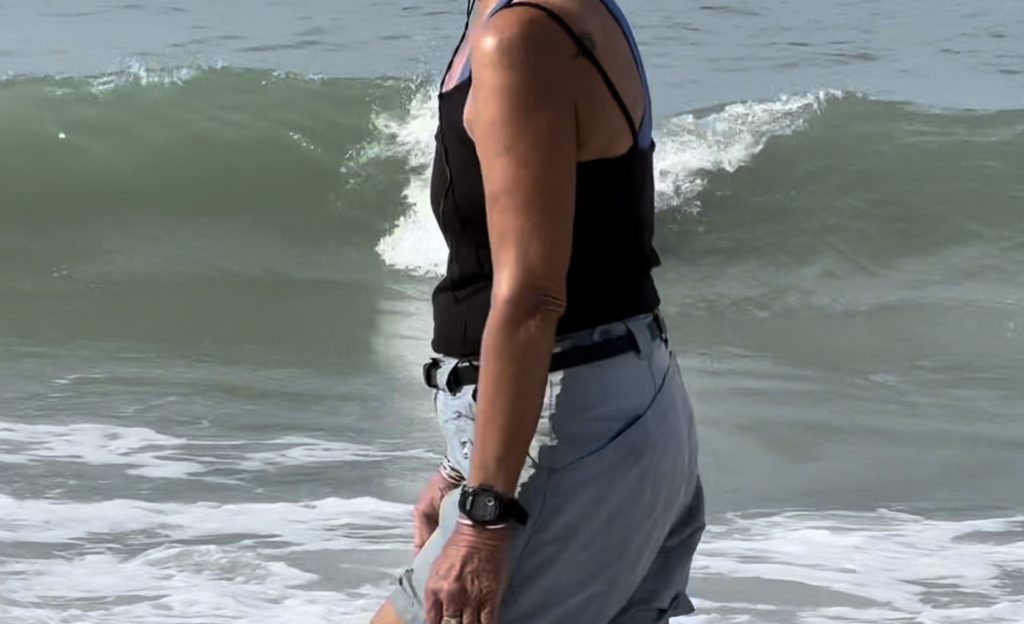
Well, it would be proof had not this annoying pedestrian walked in front of Francesca’s iPhone while she filmed me mid-ride.
Burnouts and disappointments 02
“Just as Cantor had revolutionary ideas in mathematics and was opposed, so Boltzmann, his contemporary, had revolutionary ideas in physics, and was equally opposed. This is Ludwig Boltzmann’s grave. And that…carved on it, is the equation which killed him. And it did so, because like Cantor… Boltzmann’s ideas were out of step with his times.
“In 1906, Boltzmann came here to Duino, with his wife and daughter on holiday. Exhausted and demoralized, his ideas still not accepted. While they were out walking, he killed himself, and left no note of explanation.”
“Wilhelm Ostwald, one of Boltzmann’s colleagues from his time in Leipzig, wrote an obituary for Boltzmann in which he lamented that science demanded so much of its practitioners. ‘This falls under the laws,’ wrote Ostwald, ‘to which almost all servants of the strict goddess Science are subject: their lives end in grief, and this all the more likely, the more completely they have dedicated their lives to Her.’”
Goings on 03
So, as I say, this is Francesca’s first day of the Spring semester. She has risen high in her department (chemistry), just below the department head, who plans to surrender that onerous position at the end of this semester. No one else in the department wants the position once it is vacated, so, as a last resort, they’re bringing in an outsider to fill the post. There are a couple of candidates, and Francesca is required to interview them to determine if she can stomach either as her boss in the 23/24 academic year. You know, it’s understandable that no one internal wants the position. And these outsiders are undoubtedly viewing this post, as annoying as it might be, to be a chance to leave wherever they presently are for a well respected New England university with an excellent STEM reputation.
Burnouts and disappointments 03
Kurt Gödel’s story is not atypical. “Incompleteness began to eat away at his own beliefs about the nature of mathematics. His health began to deteriorate, and he began to worry about the state of his mind. In 1934, he had his first breakdown. But it was after he recovered, however, that his real troubles began, when he made a fateful decision. Almost as soon as Gödel has finished the Incompleteness Theorem…
“he slowly starved himself to death.”
He completed this process at the Princeton IAS, where he became a close friend of another great mind hiding out at that institution, Einstein. One assumes Einstein would have made efforts to bring Gödel out of his paranoid darkness, but alas, his efforts, whatever they may have been, failed.
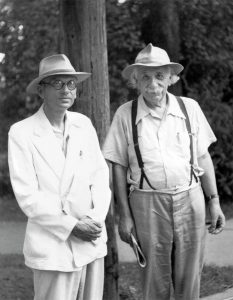
Goings on 04
So, Francesca and I have breakfast in bed (this being a school day, it was prepared by me, consisting of smoked salmon, tea, and a variety of fruits). To keep things calm – or so I thought – I made the mistake of putting the TV on YouTube, selecting one of several “LoFi Girl” animations with their soothing music. Why was this a mistake? Because it made Francesca completely lose track of time, and an hour before she needed to, she got up in a panic and started putting herself together. Having done so, she faced me, as usual, awaiting my assessment of her outfit. Her school outfits are always quite a few levels above her cohorts, and this morning’s outfit was no exception, generating a kind of Egyptian queen vibe. Not frightening, but definitely authoritative, and very chic. It was good. (Occasionally, being an aficionado of things fashion myself, I’ll suggest a change, but this is rarely needed). Anyhum, she’s now dressed, hoping she’s in time, looks at the clock and discovers she has an hour left. Lofi Girl strikes again. I am forbidden from putting on anything but news henceforth, the news metronomically ticking away the time with some accuracy. We both like Lofi Girl, with her cat, stuffed animals, computer backpack, and laptop, but she’s just too soothing for a work day.
Burnouts and disappointments 04
“So when in March 1952, [Alan Turing] was arrested, charged and found guilty of engaging in a homosexual act, the authorities decided he was a problem that needed to be fixed. They would chemically castrate him by injecting him with the female hormone estrogen.
“On the 7th of June 1954, Turing was found dead. At his bedside, an apple… from which he had taken several bites. Turing had poisoned the apple, with cyanide. Turing was dead …”
Fucking Vogon Brits. Never-mind his brilliant code breaking efforts during WWII that helped the Vogons avoid being overrun by Adolf’s minions. And recently a film was made about Turing and this work. He was evidently portrayed well, and glamorously, but in an unbelievable oversight the film completely ignoring the barbaric treatment he received at the end by his countrymen. I will never watch that film. Bloody fuchsia hell.
Goings on 05
This being an every other Tuesday I had lunch with a cluster of people who, like myself, were once affiliated with the University of New Hampshire. One still is. UNH is just down the road from our house, and my ability to cadge an adjunct teaching position there when we moved to New Hampshire was what enabled me to pay the mortgage for the first year and a half.
This cluster of people range in age from about 57 to 92, so I’m right in the middle. My time at UNH was relatively short, so when they all talk about the good old days, I am usually at a loss.
Burnouts and disappointments 05
“Ernst Stueckelberg developed the vector boson exchange force model as the theoretical explanation of the strong nuclear force in 1935. Discussions with Pauli [an arrogant bastard, IMO] led Stueckelberg to drop the idea, however. It was rediscovered by Hideki Yukawa, who won a Nobel Prize for his work in 1949 — the first of several Nobel Prizes awarded for work to which Stueckelberg contributed, without recognition.
“He suffered mental health problems and was given the treatment which was common at that time, namely administered electric shocks. Although the problems continued to recur, Stueckelberg was able to carry out his duties. A few months before his death the struggle was becoming too much for him. He said:- ‘I look forward every day to my eventual journey to Heaven … We live too long …’”
“‘The new ‘spin’ was a bit of a comeuppance for Pauli. He’d started out the year, after his usual Christmas holiday in Vienna with his parents, by stopping on his way back to Hamburg at a small university in southern Germany. There, he’d been approached by a young physicist who thought he’d come up with a good idea to explain the two-handedness of the electron: spin. Pauli ridiculed the idea and so deflated the young scientist that he never showed his paper to anyone else.”
— The Quantum Ten: A Story of Passion, Tragedy, Ambition, and Science by Sheilla Jones
A few of my quotes are from Sheilla’s book, by far my favorite book on those heady years. This quote makes me wonder how many bright young minds Pauli quashed via his knee jerk negativity. By the way, the “comeuppance” referred to above pertains to a pair of theorists at Leiden independently attributing spin to the electron. Evidently they did not consult Pauli on the viability of the idea, and it was soon broadly adopted. Of course, theoretical physics being the circus sideshow that it is, the idea is often attributed to Pauli.
Goings on 06
It is now a day later. Francesca and I are seated at our favorite cafe, both with laptops open before us. We’ve finished lunch. I had fried eggs, sourdough toast and bacon, because Francesca likes to steal half the bacon. She had a bowl of some vegetable matter. While eating I got out my Kindle and read a chapter of the latest Brunetti mystery to which I am addicted. At one point Brunetti’s wife, Paola, feeling that her husband’s company is beginning to grate, tells him to go away. “Watch television”, she tells him. “I hate television”, he replies. “Then come help me with the dishes.” The ever resourceful Brunetti replies, “I love television.”
Brunetti and Paola are Italians living in Venice. Donna Leon, the author, is an American, but lived for several decades in Venice. Her sense of humor is wry and wonderful.
Burnouts and disappointments 06
“From the correspondence with his close friends, from May 1931, it appears that Paul Ehrenfest suffered from severe depression. By August 1932, Einstein was so worried that he wrote to the Board of the University of Leiden, expressing deep concern and suggesting ways in which Ehrenfest’s workload could be reduced.
“Having made arrangements for the care of his other children, on 25 September 1933, in Amsterdam, Ehrenfest fatally shot his younger son Wassik, who had Down syndrome, then killed himself.”
Ehrenfest attended the 1927 Solvay conference and was a contributor to the founding of quantum mechanics, an activity that never resulted in the rewards he craved. He’s third from the left in the back in this photograph. I’m seated on the ground in the front, my participation in that conference is little known.
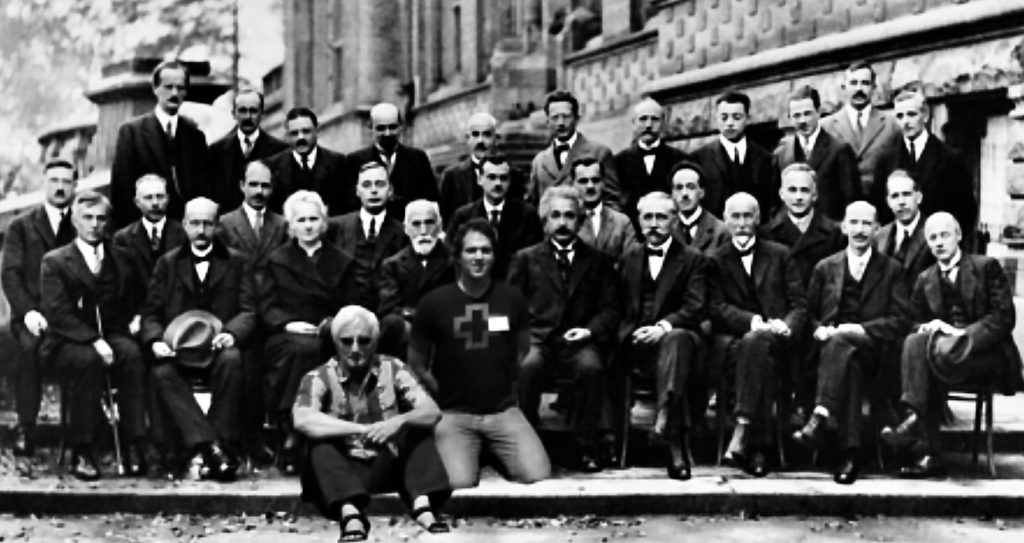
Goings on 07
Speaking of Europe, as mentioned in several previous episodes, Francesca and I plan once again to wend our way to Italy and France this May/June. It now looks like this: 5 days Turin; 2 weeks Santa Margherita; 5 days Nice; 2 weeks Paris. We’re going to attempt to do this without a car this year. The wisdom of that decision is unclear.
Airbnbs for the first three locations have been arranged. I am feeling rather chuffed, and hope that in 5 days when my cancer gets a look-see at Mass General that my general feeling of optimism will be rewarded. [It was.]
Burnouts and disappointments 07
Freeman Dyson once said: “Some mathematicians are birds, others are frogs. Birds fly high in the air and survey broad vistas of mathematics out to the far horizon. They delight in concepts that unify our thinking and bring together diverse problems from different parts of the landscape. Frogs live in the mud below and see only the flowers that grow nearby. They delight in the details of particular objects, and they solve problems one at a time.”
Alexander Grothendieck, in everyone’s estimation, was a bird, brilliantly excelling in abstraction, but often perplexed by the frog’s eye view.
“Grothendieck worked in a very very (often unnecessarily) general and abstract framework which is enough to make any mathematician ‘swept away’ (according to Pierre Deligne).”
This tendency to abstraction was a pathology for which there was no cure.
“One striking characteristic of Grothendieck’s mode of thinking is that it seemed to rely so little on examples. This can be seen in the legend of the so-called ‘Grothendieck prime’. In a mathematical conversation, someone suggested to Grothendieck that they should consider a particular prime number. ‘You mean an actual number?’ Grothendieck asked. The other person replied, yes, an actual prime number. Grothendieck suggested, ‘All right, take 57.’ But Grothendieck must have known that 57 is not prime, right? Absolutely not, said David Mumford of Brown University. ‘He doesn’t think concretely. … He never really worked on examples,’ Mumford observed. ‘I only understand things through examples and then gradually make them more abstract. I don’t think it helped Grothendieck in the least to look at an example. He really got control of the situation by thinking of it in absolutely the most abstract way possible. It’s just very strange. That’s the way his mind worked.”
And that way of thinking eventually led to a kind of psychological break with reality.
“For the last two decades of his life he broke off with the maths community, his wife, a later partner and even his children. He sought total solitude in the village of Lasserre in the foothills of the Pyrenees. Here he wrote remarkable self-analytical works on topics ranging from maths and philosophy to religion.”
Most writers on that period of his life are generous in their understanding, seemingly providing him immunity to labeling him gonzo at the end. However, my reverence for his work, with which I have something barely above zero familiarity, leads me to a harsher conclusion. He was, I suspect, never entirely all there … but I suppose there’s nothing wrong with that. But during those last 20 years he was definitely gone, despite having a physical abode.
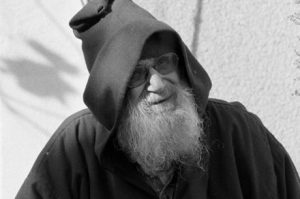
But who am I to say? It’s complicated. Personally, I gave up my pursuit of truth in theoretical physics because I knew I was headed for the Pyrenees. I will go to my grave convinced that my “ideas [are] out of step with [my] times.”
Many prominent mathematicians and theoretical physicists ended their lives peacefully. People like Bohr, Schrödinger, Dirac and Einstein, received enough acclaim during their lives to keep their minds intact, their egos inflated. But what about Gödel and Grothendieck? They too received ample recognition during their working years, and yet … Abstraction was the serpent in their Eden. They bit – bit very very hard – and eventually they were expelled from Eden into some place less nice. (On the other hand, Grothendieck doesn’t look unhappy in that photo. On the other other hand, had he been so changed by that point that this was a new person? On the other other other hand, was this a better person, more content?)
Il y a plus
“German scientist Julius Mayer actually came up with the notion of conservation of energy a few years earlier than either Helmholtz or Joule, but he was working as a Dutch ship’s doctor in the West Indies and was seriously out of the loop. Mayer, upset that his work remained unappreciated by the science community, tried to commit suicide in 1849 by jumping out of a third-storey window, but he succeeded only in breaking both his legs. He ended up a cripple in an insane asylum.”
=======
=======
Marco Tavoro Ph.D. posted this on LinkedIn: Ettore Majorana was a brilliant physicist who mysteriously vanished in 1938.
According to the renowned physicist and Nobelist Enrico Fermi: “There are [many] categories of scientists; those of 2nd or 3rd rank […] never get very far. Then there is the 1st rank, those who make important discoveries […].
But then there are the geniuses, like Galileo and Newton. Majorana was one of these.” Indeed, according to colleagues, his grasp of physics was almost unrivaled.
He published his first paper as an undergrad. A flurry of important papers followed. However, according to the CERN Courier Magazine, “[He was] a genius who looked on his work as completely banal: once a problem was solved, [he] did his best to leave no trace of his brilliance.”
At some point in his life, he started to suffer from nervous exhaustion, became a hermit, and shut himself off from the world. Theories about his disappearance abound: suicide, fleeing to South America, entering a monastery, kidnapping or murder, etc.
Fermi told his wife, “Ettore was too intelligent. If he has decided to disappear, no one will be able to find him.”
[It appears he ended his days in Venezuela, his own personal Pyrenees.]
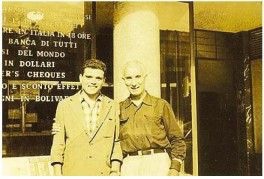
[This is probably not Majorana. Someone compared this face to Majorana as a young man. Still, this guy looks does look happy. I need to believe Majorana was happy, too.]
[From the web: “He was not killed, nor did he commit suicide, much less shut himself up in a convent. Ettore Majorana, world-famous physicist, who grew up in the atomic study center in via Panisperna, in Rome, placed by some experts between Newton and Einstein, disappeared mysteriously in 1938, was alive in the period 1955-1959 and lived in Venezuela, in the city of Valencia. This was ascertained by the Rome prosecutor’s office which, after opening a file in 2011 on the scientist’s disappearance, has now asked for it to be dismissed.” Yay.]
Cafe closing soon
I’m reasonably content with this blog, but have no idea what to write about next. Maybe I’ll just put together some happy encounters with local canines.
J’ai fini pour l’instant.

